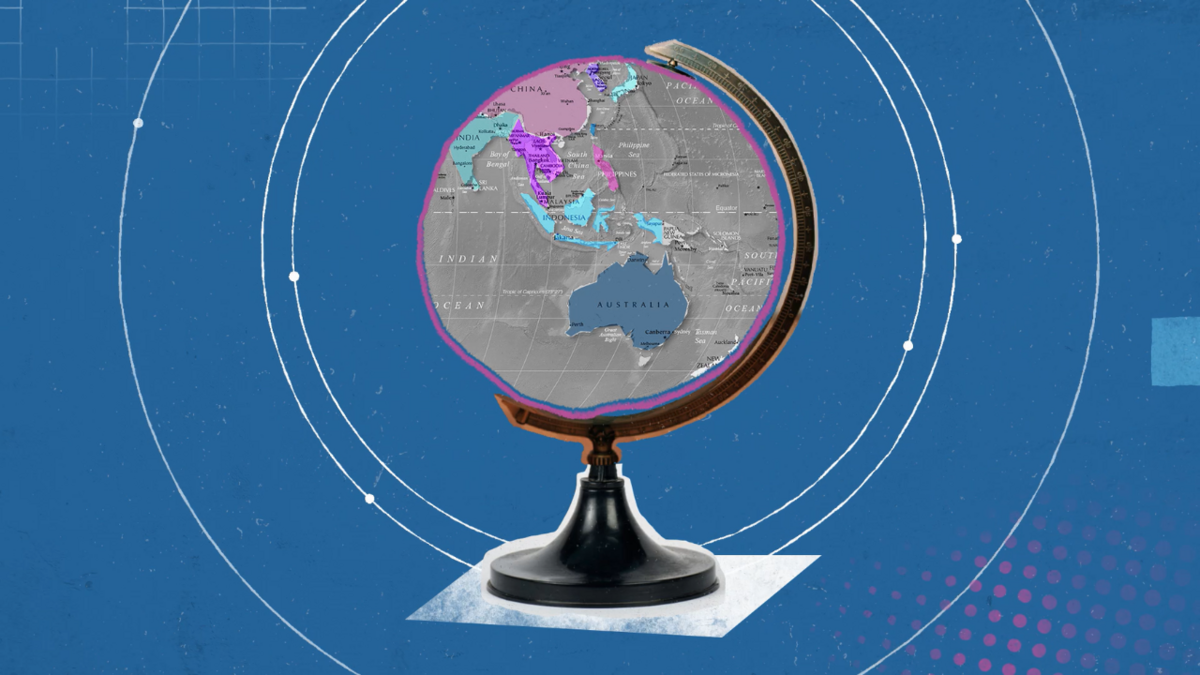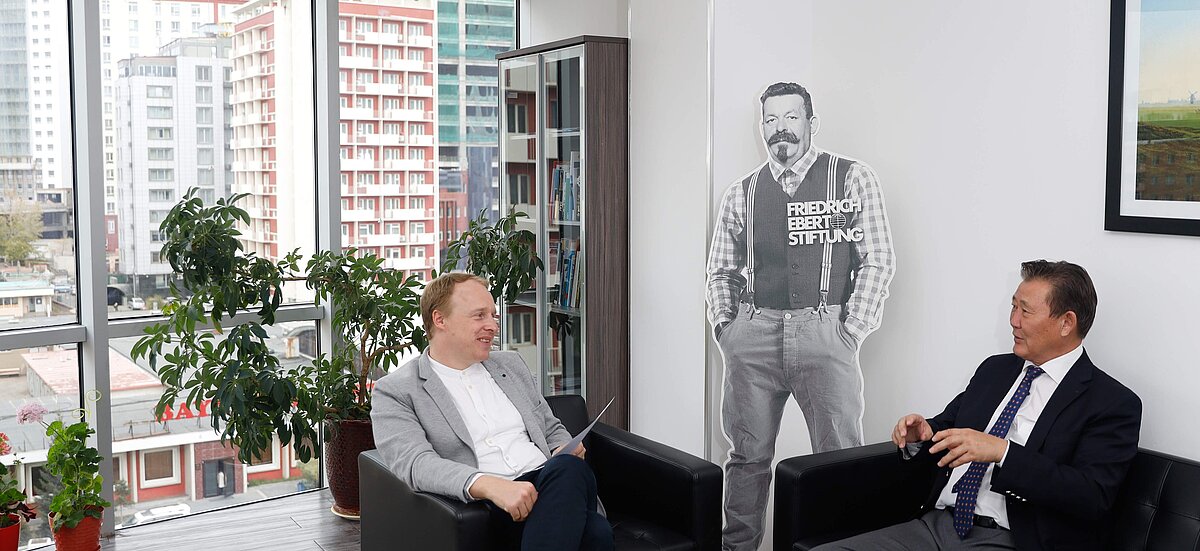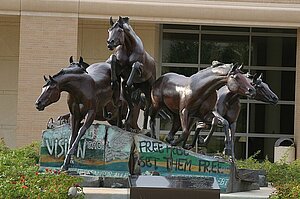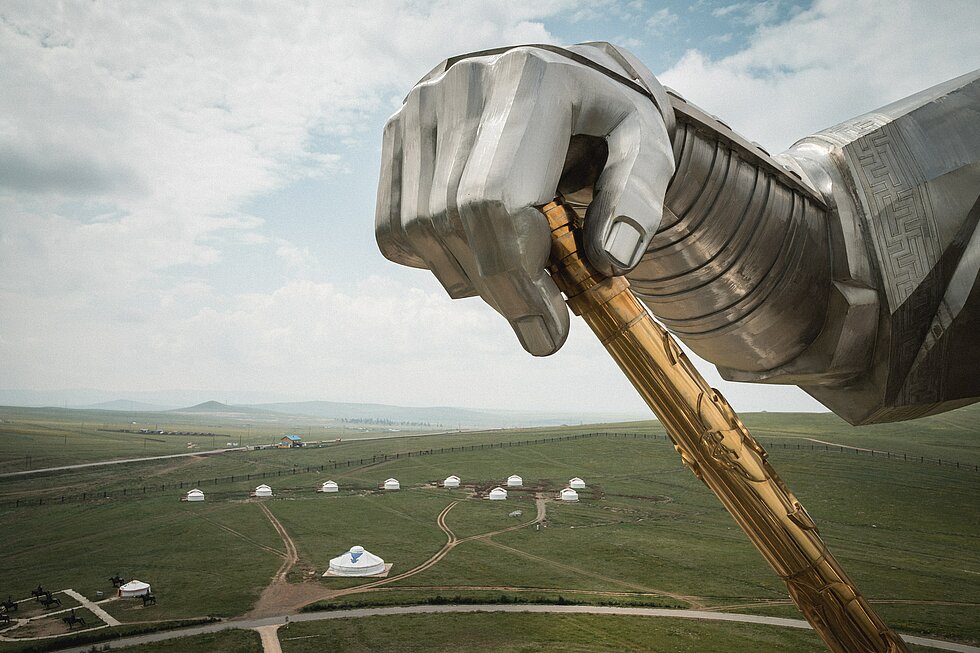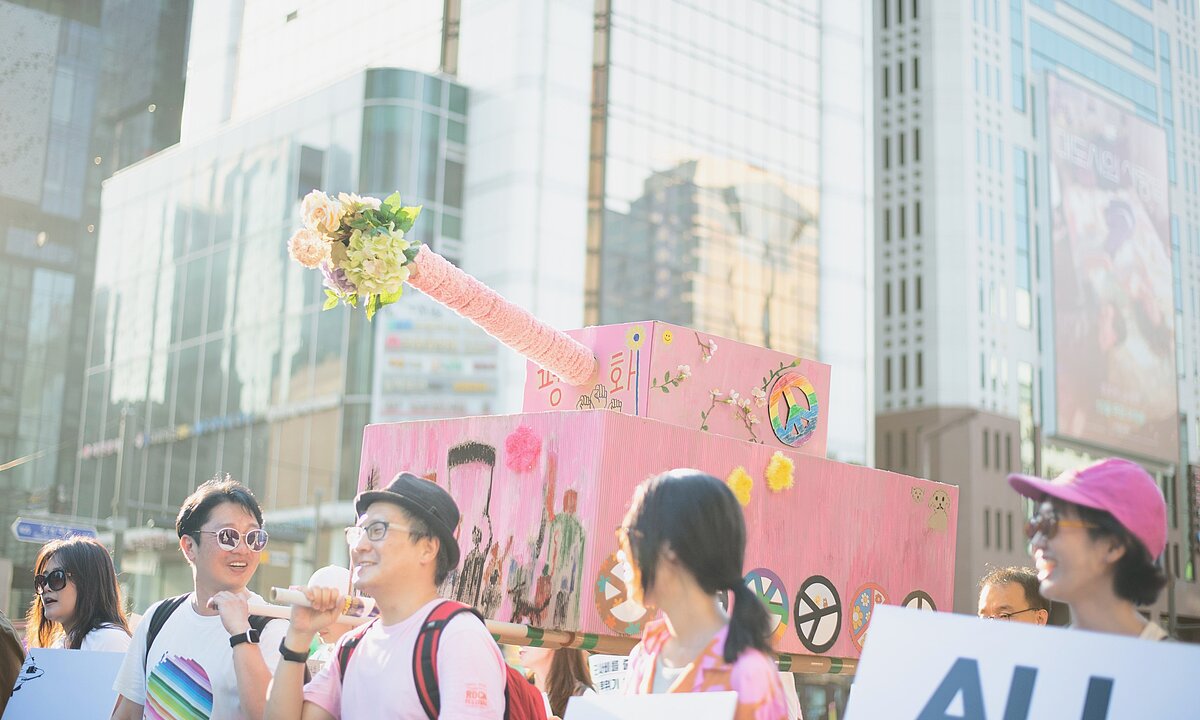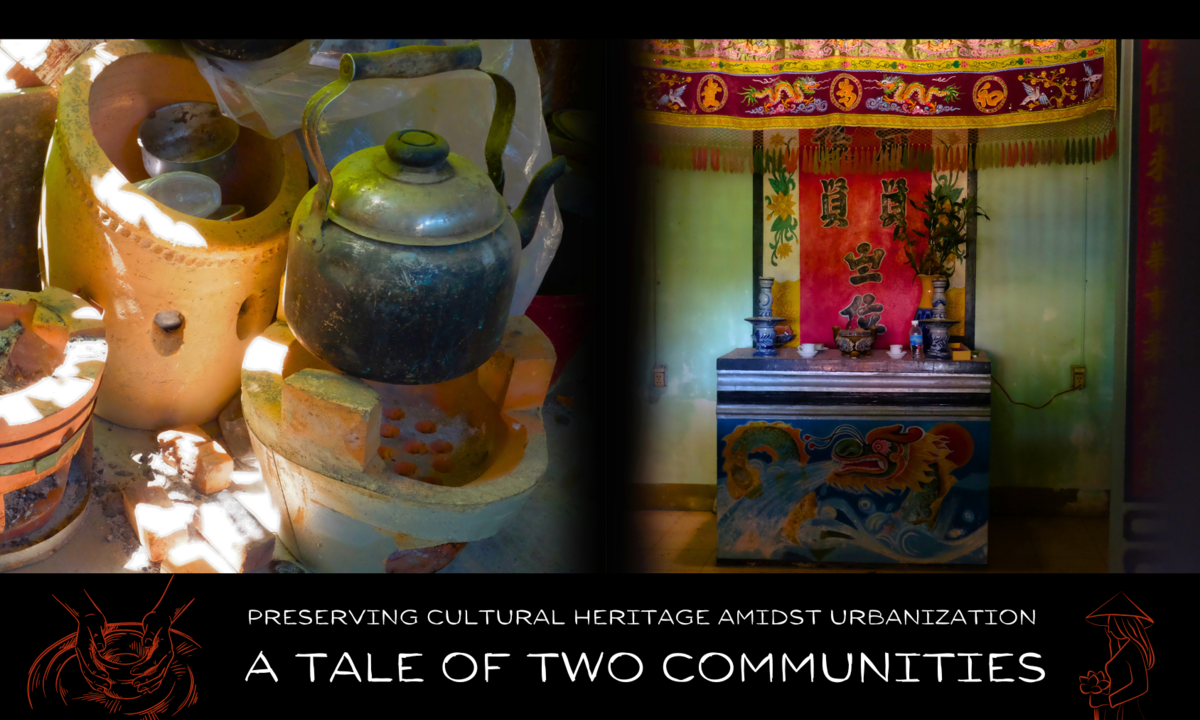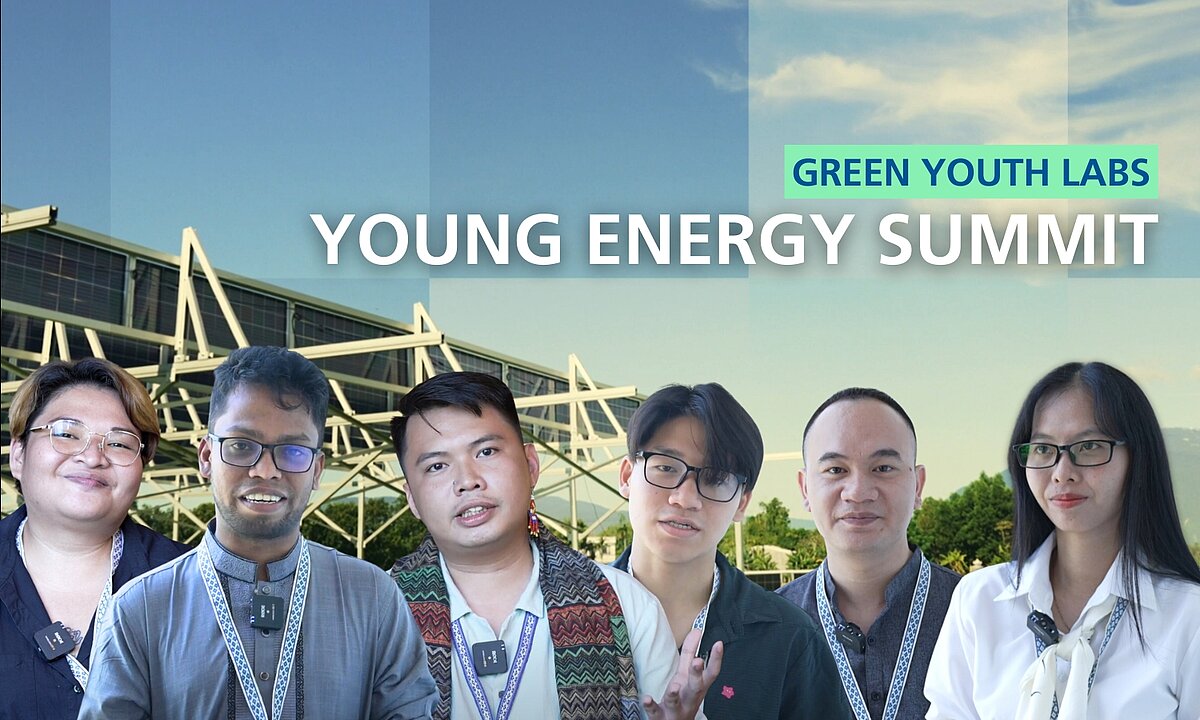A day that turned history: 30 years after the fall of the Berlin Wall
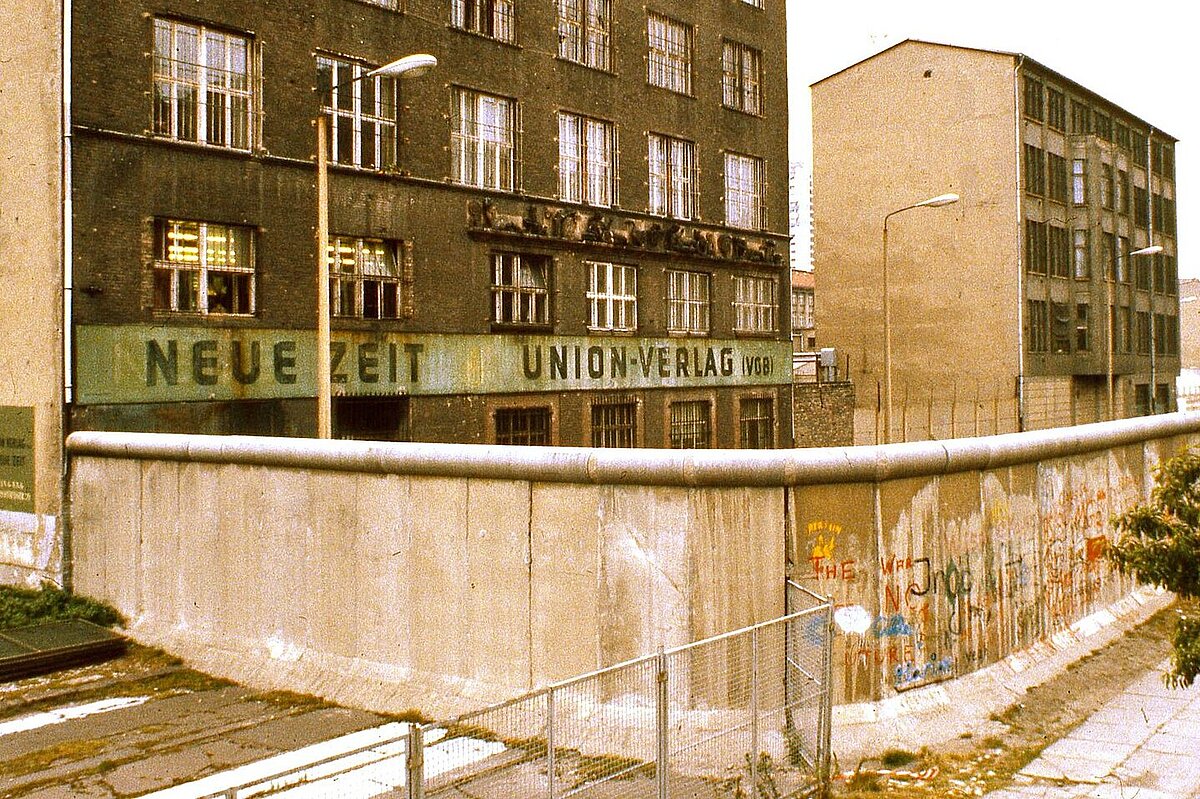
When the Berlin Wall fell on November 9, 1989, Dendev Terbishdagva, from Mongolia, a socialist country until 1990, was working as a lecturer and translator in Berlin, on the eastern side of the division.
Terbishdagva was one of the few Mongolian citizens to witness the collapse of the Iron Curtain, the Wall coming down and German reunification in Berlin. He was working at the Youth Academy of the young communist organization Freie Deutsche Jugend (FDJ). He had come to Germany to study in 1975. He returned to East Germany in 1988, and then he remained in reunified Germany until 2000.
He returned again when he was Ambassador of Mongolia to Germany, from 2002 to 2004. Terbishdagva shares his recollections of the events he witnessed 30 years ago, with the collapse of the Iron Curtain, in this interview by Niels Hegewisch, resident representative of the Friedrich-Ebert-Stiftung in Mongolia.
You studied in East Berlin and worked as a lecturer for Mongolian students at the FDJ Academy before the end of the Cold War. So, you witnessed the end of the Wall from the eastern side. What were you doing on November 9, 1989, and how did you find out about the Berlin Wall coming down?
On November 9, 1989, I was just working as usual at FDJ Academy at Bogensee, near Bernau. There, as lecturer and interpreter, I was teaching junior Mongolian socialist cadres. The FDJ Academy was a Communist training centre for young people from East Germany and more than 60 countries. On that day, friends from Mongolia happened to be visiting my wife and me.
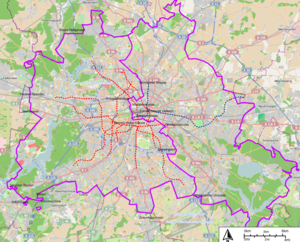
We were living in Bernau, near Berlin. That evening, we were watching an East German news programme called “Aktuelle Kamera”. It was reported that the Central Committee of the SED [Socialist Unity Party] had decided that, from that day on, everyone could travel freely to West Germany and West Berlin. Western television stations that we received in Bernau even said that the Wall had been opened. We could scarcely believe our ears. But we weren't overjoyed.
At first, we were still anxious because the division of the world into two camps was for us a given—something we didn't question—and the Berlin Wall was its manifestation, a symbol. Had all the tensions suddenly become a thing of the past? What would become of the GDR [German Democratic Republic]? Would it possibly end in violence after all? The inner turmoil that my wife and I had already been witnessing since the Monday demonstrations began taking place throughout the GDR had been difficult to bear.
“I had always thought that a wall that cuts through families, dividing a people, could not be a permanent fixture. But I had not dared to believe that it would all happen so soon and at such breathtaking speed.”
On that evening, however, our curiosity got the best of us. In the end, and just like thousands of others, we made our way to the Wall, in the heart of Berlin. Things were already pretty exuberant on the local rail line leading to the Brandenburg Gate. When we arrived at the Wall, we saw fireworks going off and people celebrating. We were not able to make it to the border because of the crowds of people.
As foreigners living in East Germany, we would not have dared to cross the border anyway. Later in the evening, we drove back home. I had to reflect a lot about Mongolia. How would the news from Germany be received there? What would become of this Soviet satellite State situated between Russia and China? People were celebrating on the streets of Berlin. People were even dancing in the streets of Bernau. When things remained peaceful over the following days and the Brandenburg Gate was ceremoniously opened in December, our tense mood gradually relaxed.
I had always thought that a wall that cuts through families, dividing a people, could not be a permanent fixture. But I had not dared to believe that it would all happen so soon and at such breathtaking speed. I had come to East Germany from a distant country, and I witnessed how East and West, capitalism and socialism, united peacefully.
What happened in the days and weeks after the Wall came down?
A few days later we drove with our children to the Wall to get a chunk of it as a souvenir. I only had a small hammer, and it turned out to be extremely difficult to knock out a piece of it with this woefully inadequate tool.
All that I was able to break out were a few small pieces of cement. After redoubling my efforts, I finally managed to dislodge a larger chunk of the Wall. I wrapped it in a blue silk scarf, according to Mongolian tradition, and still have it today. In accordance with Buddhist tradition, I keep this piece of the Berlin Wall in my prayer corner in our guest room. It reminds me to pray that there will never again be another wall that divides a whole people and that people can live together in harmony.
What was the mood like among German and international students and lecturers at your school?
The FDJ Academy was a place where young Communist cadres were trained. Even before the fall of the Berlin Wall, when people in Leipzig and elsewhere were taking to the streets, the climate at our school began to change. You could feel that something was brewing, that things couldn't just keep going the same way for long. After the fall of the Berlin Wall, a great uncertainty began to sweep through the Academy. For many, it was the end of the world. They had believed in socialism and its superiority. They had supported East Germany and the SED State. They recoiled in horror over the thought of impending reunification with an overpowering West Germany. Almost everyone was worried about their future.
I had the impression that nobody really wanted speedy reunification. The preferred outcome was close cooperation between the two German States and reunification at some point in the distant future. Basic, but also very personal considerations played a role here. After all, who in a reunited Germany would still need experts on scientific Communism or lecturers on East German history?
The intellectual elite of the SED State faced a threat of a precipitous slide into unemployment. Some people became depressed and alcoholics as a result. Others simply failed to show up for work. I did not recognize many of my colleagues anymore. Only a short time before, they had been full of confidence and were convinced of Communism as a science. Everything they had ever believed in all their lives had been turned upside down. Looking back, I would say that the collapse of an order in which one had always believed, despite some criticism that one kept very much to themselves, weighed more heavily than the loss of jobs and income.
“Everything they had ever believed in all their lives had been turned upside down. Looking back, I would say that the collapse of an order in which one had always believed, […] weighed more heavily than the loss of jobs and income.”
Classroom instruction continued for the time being, however, it was only in spring 1990 that our school closed. But from that point on, there was plenty of open, critical discussion. The times in which the Party and the State had been praised in glowing terms came to an abrupt end. Students inundated lecturers with questions that they had no answers to and which they often tried to sidestep in their wavering uncertainty.
You were a Mongolian student in the GDR. What impression did the country make on you back then?
For the best pupils in my class year in socialist Mongolia at that time, it meant an opportunity to study in a befriended socialist country. And it was in this way that I, a simple nomadic child from the countryside, was given the opportunity to go to a university in one of the socialist countries. I was interested in Germany.
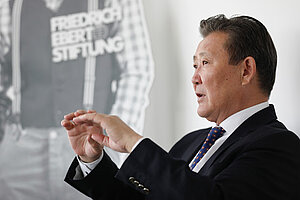
East Germany was considered to be the most highly developed country in the socialist world, and I envisaged it in the most vibrant and dazzling colours. I wanted to see it with my own eyes, study there and learn a lot. And so I studied food technology at Humboldt University in Berlin. I followed in the footsteps of the first Mongols who had gone to Germany as students as far back as the 1920s to learn how they could construct a successful education system in Mongolia.
The journey from Ulaanbaatar to Leipzig, where I was first to learn German at Herder Institute, was by train—an interminable journey. On the way, Mongolian students made a stop in Moscow, where I was literally stunned by the splendour of the centre of the Soviet capital.
How grey it was in Germany! As a child from the countryside, I was used to the blue sky, the glowing red sun and clear, starry nights. I did not find any of this when I arrived in East Germany. Clouds hung low from the grey sky, it was foggy, and there seemed to be a monolithic grey pall hanging over the entire city. Even the people seemed grey and monolithic to me. Where had I ended up? Would the sun ever shine here? But I got used to things and settled in quickly and on a positive note. In my time as student, I made a lot of friends, many of whom I still have today. I met my wife in Germany, started a family and we raised our children there.
Today, I regard Germany as my second home.
There is a pretty big discussion in Germany about whether the East Germans were placed at a disadvantage over the course of reunification or not. How did you perceive the period during and following official reunification?
The years following the fall of the Berlin Wall in November 1989 and the official reunification in October 1990 were exciting times. As an outsider, it seemed to me at the time that the West was calling the shots. They did not ask what had perhaps gone well in East Germany, instead wiping the slate clean. Anything and everything was suspected of Communist indoctrination. My East German colleagues and friends sometimes had major problems muddling through in the new order.
At that time, there was a widespread feeling that East Germans were second-class citizens. Reunification had considerable implications for our family life. My wife and I lost our jobs and had to reorient ourselves in an entirely new world, literally overnight. That wasn't easy and exploded our powers of conception. The very concept of unemployment, either in Mongolia or in East Germany, was unknown until then, like in other socialist societies. Nonetheless, we still had an unlimited residence permit issued by the East German authorities. We were counting on a reunited Germany experiencing a steep economic upturn. We also had our children in mind—they had become accustomed to Germany and liked it. And, of course, we were very curious about the new society that was taking shape. So, we decided to stay in Germany.
“We had already been through the transformation from state socialism to a free market economy, which our countrymen still had before them.”
We received three months of salary as compensation from the FDJ Academy. After I had worked for a while as a waiter and employee at the city of Bernau's Office for Foreigners, my wife and I began exporting goods from Germany to Mongolia in the post-reunification period. Surplus and left-behind goods from the Red Army, which was withdrawing from East Germany, were selling well in Mongolia. Boots of Soviet and East Germany's National People's Army soldiers were particularly in high demand. Mongolian nomads liked to use them as riding boots. Later, we opened the first supermarket in Mongolia, where we sold food, household items, cosmetics, shoes and clothing from Germany. This turned into a decent business that continues to thrive to the present.
What we had experienced in connection with German reunification turned into an advantage for us in Mongolia. In Germany, we had already been through the transformation from state socialism to a free market economy, which our countrymen still had before them. My entire political and business life has benefited from the experiences I had in conjunction with the Berlin Wall coming down.
Later, you were also the Mongolian ambassador to the Federal Republic of Germany. As a Member of Parliament, you maintain close contacts with Germany to this day and go there regularly. What is your view of reunited Germany today?
Despite all the ongoing difficulties surrounding the process of reunification, I still see it as a success story. The two parts of Germany have grown together well. I am optimistic that the people of Germany will succeed to resolve whatever problem remains.
Germany's reunification also served as a model for Mongolia. In 1990, we made the transition from socialism to democracy and a market economy in our own peaceful revolution. But we can also learn from Germany in coming to terms with a difficult past in which cruelties and heinous crimes were committed in the name of the State.
In the 1930s, over 30,000 innocent citizens, including intellectuals, monks and officials, were murdered in cold blood and more than 700 Buddhist temples destroyed in Mongolia in the name of Communist ideology during the Stalinist purges. At that time, uninhibited violence was the order of the day, and no limits were set. This inflicted wounds among many families that have yet to heal to this very day. This ‘inner wall’ has yet to be completely torn down. The 30th anniversary of the fall of the Berlin Wall also bears witness to this.
###
For more information on the work by Friedrich-Ebert-Stiftung in Mongolia contact the country office staff and follow the official Facebook fan page for daily updates.
FES Asia
Bringing together the work of our offices in the region, we provide you with the latest news on current debates, insightful research and innovative visual outputs on the future of work, geopolitics, gender justice, and social-ecological transformation.
